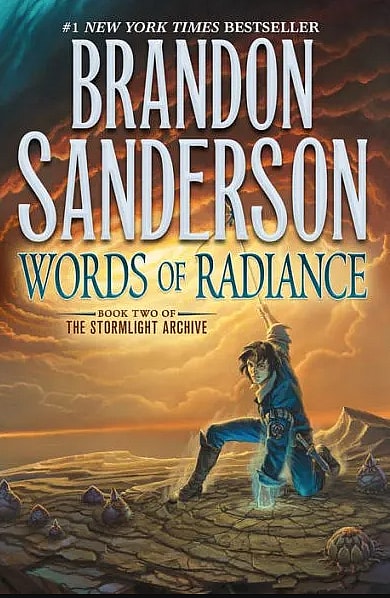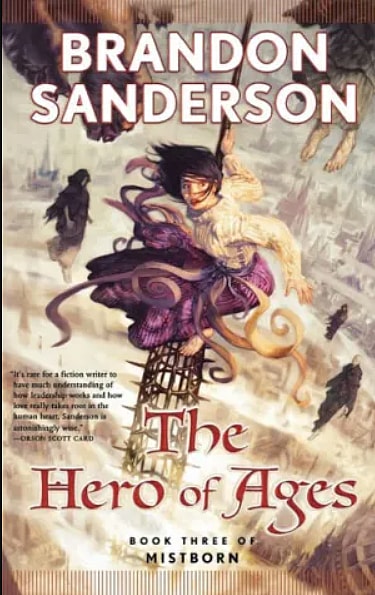Brandon Sanderson Gives The Classiest Response To The Wired Hit Piece About Him And His Readers

Last week, Wired Magazine published a sprawling article lambasting Brandon Sanderson and his legion of fans. While most authors would have taken great offense to the hit piece, Sanderson replied with a classy response.

RELATED: Wired Publishes Nasty Hit Piece On Brandon Sanderson And His Fans
Sanderson published a lengthy statement to his fans in the Mistborn subreddit.
He began, “I appreciate the kind words and support. Not sure how, or if, I should respond to the Wired article. I get that Jason, in writing it, felt incredibly conflicted about the fact that he finds me lame and boring. I’m baffled how he seemed to find every single person on his trip–my friends, my family, my fans–to be worthy of derision.
“But he also feels sincere in his attempt to try to understand,” Sanderson continued. “While he legitimately seems to dislike me and my writing, I don’t think that’s why he came to see me. He wasn’t looking for a hit piece–he was looking to explore the world through his writing. In that, he and I are the same, and I respect him for it, even if much of his tone seems quite dismissive of many people and ideas I care deeply about.”

Sanderson went on, “The strangest part for me is how Jason says he had trouble finding the real me. He says he wants something true or genuine. But he had the genuine me all that time. He really did. What I said, apparently, wasn’t anything he found useful for writing an article. That doesn’t make it not genuine or true.”
“I am not offended that the true me bores him,” he noted. “Honestly, I’m a guy who enjoys his job, loves his family, and is a little obsessive about his stories. There’s no hidden trauma. No skeletons in my closet. Just a guy trying to understand the world through story. That IS kind of boring, from an outsider’s perspective. I can see how it is difficult to write an article about me for that reason.”

“But at the same time, I’m worried about the way he treats our entire community,” Sanderson shared. “I understand that he didn’t just talk about me, but about you. As has been happening to fantasy fans for years, the general attitude of anyone writing about us is that we should be ashamed for enjoying what we enjoy. In that, the tone feels like it was written during the 80s. ‘Look at these silly nerds, liking things! How dare they like things! Don’t they know the thing they like is dumb?’”
“As a community, let’s take a deep breath,” he advised. “It’s all right. I appreciate you standing up for me, but please leave Jason alone. This might feel like an attack on us, on you, but it’s not. Jason wrote what he felt he needed–and as a writer, he is my colleague. Please show him respect. He should not be attacked for sharing his feelings. If we attack people for doing so, we make the world a worse place, because fewer people will be willing to be their authentic selves.”

“That said, let me say one thing. You, my friends, are not boring or lame,” he asserted. “In Going Postal, one of my favorite novels, Sir Terry Pratchett has a character fascinated by collecting pins. Not pins like you might think–they aren’t like Disney pins, or character pins. They are pins like tacks used to pin things to walls. Outsiders find it difficult to understand why he loves them so much. But he does.”
“In the book, pins are a stand-in for collecting stamps, but also a commentary on the way we as human beings are constantly finding wonder in the world around us,” Sanderson explained. “That is part of what makes us special. The man who collects those pins–Stanley Howler–IS special. In part BECAUSE of his passion. And the more you get to know him, or anyone, the more interesting you find them. This is a truism in life. People are interesting, every one of them–and being a writer is about finding out why.”

“In that way, the ability to make Stanley interesting is part of what makes Pratchett a genius, in my opinion. That’s WRITING,” he declared. “Not merely using words. It’s what I aspire to be able to do. People are wonderful, fascinating, brilliant balls of walking contradiction, passion, and beauty. I find it an exciting challenge to make certain that the perspective of the washwoman or the monk sitting and reading a book is as interesting in a story as that of the king or the tech-mogul.”
He then added, “And I find value in you. Your passion for my work is a big part of why I write. You make my life special. Thank you.”

Sanderson then closed out with a reminder, “I do want to make it clear, again that I bear Jason no ill will. I like him. Please leave him alone. He seems to be a sincere man who tried very hard to find a story, discovered that there wasn’t one that interested him, then floundered in trying to figure out what he could say to make deadline. I respect him for trying his best to write what he obviously found a difficult article.
“He’s a person, remember, just like each of us,” he concluded.

Sanderson takes the Wired editor at face value as if the article was written in good faith, even though the author called several of Sanderson’s fans “menboys” and made several elitist comments implying Sanderson’s fans didn’t understand nor care about good prose or sentence construction when being fans of Sanderson’s work.
The post on Reddit further illustrates exactly who Sanderson is—a nice person who truly cares about fantasy fiction in every regard, not just in his writing, but in the fiction he enjoys.
He’s right that the tone of the Wired post felt like it was written at a time before geek culture overwhelmed mainstream pop culture. With events like San Diego Comic Con drawing well over a hundred thousand people, geek culture outpaces many sporting events for how many people tune in. With TV and movies in the fantasy and sci-fi genres being the biggest blockbusters out there, millions of fans love this genre of fiction.

Instead of asking why so many people would love work like this and why Sanderson resonates with the people with his incredibly fast-paced and well-constructed fiction, the Wired writer derides Sanderson’s fans as nerds with what he considers bad taste.
In reality, the entire worldview of the legacy media is in bad taste. They don’t understand that stories of real heroes, faith, and family resonate because it’s how our Creator designed humans. We have a visceral response to stories that hold those truthful elements because it reflects the nature of God’s creation. To the San Francisco liberal who works in a Wired office, it’s something he cannot comprehend, and to his detriment.
With a response like this, it’s no wonder Sanderson has so many fans and readers—as he puts them first. He considers fans his friends and people he should respect and cater toward.
Other mainstream writers should look at what he’s doing and reflect the sheer joy and love for his work and customer base, and perhaps they’d have as much success.
What do you think about Brandon Sanderson’s response to the Wired article attacking him? Leave a comment and let us know!
